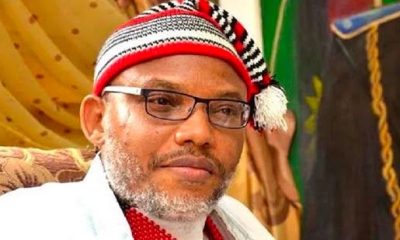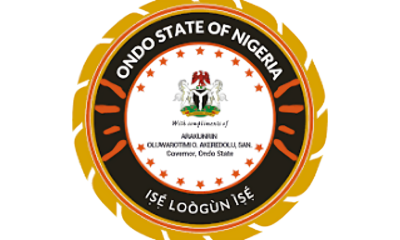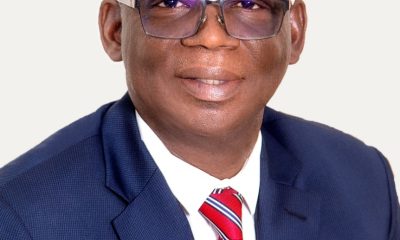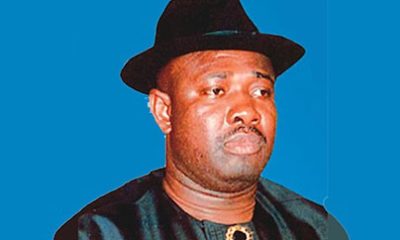Environment
Cross River State Forest Protection Needs Community Support – Egot
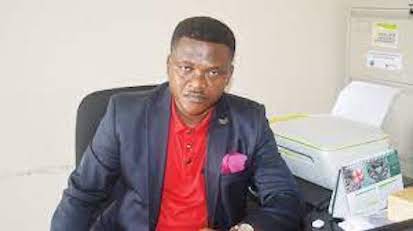
Dr Martins Egot is Executive Director of Panacea for Developmental and Infrastructural Challenges for Africa Initiative (PADIC-AFRICA), In this Interview with DAILY ASSET Correspondent, PATRICK ABANG in Calabar, he spoke on a wide range of issues Concerning Cross River National Park and Community Forest.
ExcerptsThe Federal Government recently gave license to two firms to mine the Cross River National Park, what is your take on this?
Apart from the fact that the environmental organisation is very concerned about the environment of Cross River State and it’s forest communities, we have been in very close partnership with the Cross River National Park for over ten years now.
They have been part of building capacity of our community eco-guards that we train and support to take care of, manage and carry out surveillance and protection of community forests. The National Park has been very cooperative and they have been seeing results from our partnership but this same National Park is being encroached. For example, in Ofumkpa, where this mining activity is really happening, for two years now we have been having joint patrols with the National Park officers, Rangers and the community eco-guards that we put together in Ofumkpa and they have been protecting the forests together. But suddenly, we hear that there is licence given to companies to mine, there is so much disaster in that place and for us, it is very disheartening.What is your concern?
Our major concern is that for over eight to 10 years now, Cross River state has been suffering from deforestation, degradation and timber exploitation recklessly, without control. We have been fighting this throughout with all our might and it has not been easy because we have lost so much in the forest. We have three forest regimes in Cross River state. These are Community Forest, National Park and the Government Reserve. The community forest and the government forest reserve, which are under community and state government management, have come under serious attack and we are losing them massively. Our hope in Cross River State forest is the National Park, that is why we have the bulk of forest left but if we do not take our time, the experience we have within the last 10 years in the community and government forests, is coming over to the National Park.
As we speak, there are several areas that mining is happening in Cross River State except the National Park. Mining is coming into Cross River State massively and now, they have entered the National Park which is a big worry. If we do not take things more seriously in the National Park, there will be a disaster there and Cross River State will have nothing to show in forest because we do not know how to manage the community and government reserve forests that we have. Government institutions are not helping matters, so that is the major worry that made us make noise and tell people about it in order to stop the anomalies.
Is the National Park fulfilling its mandate?
The National Park Service Act (2006) unequivocally underscore that national parks are sanctuaries meant exclusively for the propagation, protection and management of vegetation and wildlife. Notably, Section 22 of the Act delineates the functions of Management Committees, reinforcing the exclusive dedication of national parks to the propagation, protection and management of vegetation and wildlife.
Section 29, clearly makes an offence for any unauthorised person to go into the National Park without the permission of the Conservator-General. Mining activities are explicitly prohibited in section 30(1) of the Act” which says, “a person who, unless authorised to do so under this Act or the regulations under this Act, carries out an undertaking connected with forestry, agriculture, grazing or excavation or does any levelling of the ground or construction or any act tending to alter the configuration of the soil or the character of the vegetation; or does an act likely to disturb the fauna or flora; or engages in drilling, mining, prospecting or exploration of any kind of natural resources.. Is guilty of an offence.
The National Park therefore has the mandate to manage and protect the National Park and the Federal Ministry of Mines and Steel Development should not in anyway, give out leasing rights to any mining company in the National Park and they know this. We are trying to get to the appropriate authorities to ensure that this is reversed as soon as possible. As we speak, it is still happening in Ofumkpa.
What are the benefits of the National Park to the state and the people?
Even as environmentalists, we are not completely in anyway opposed to government making money from resources that they have but we are saying that things should be done rightly. The status of Cross River State nationally and internationally, as custodians of the highest and remaining rainforest in Nigeria, is there. They ought to be ecological benefits, international recognitions and even funding to gain from this. At some point, discussions are on the way to begin to pick community and state benefits for having their forests intact. If we do not show working to show that we are compliant to conservation and protection, then we would lose out of it. Conservation is not completely saying do not make money from it, it is saying let us do it in the right direction and the proper way. We have always told people, timber dealers and community people to do the right thing by ensuring that they know the numbers of trees that they are extracting from the forests and ensure that they are of marketable size approved and following best practices as they would still make money from that. The National Park is a reserve that can give us funds from eco-tourism and we would still have our forests intact at that level.
For the Federal government to designate National Parks, they are for ecological, ecosystem benefits and tourism. Our sons, daughters and people from Cross River state are also being employed and they get salaries being paid as staff of the National Park.
Some persons have argued that the National Park is of no benefit to the people and the state, what is your view on this?
You cannot monetarily quantify what you have in the forest, apart from the ecosystem services which is life itself. But if you do real tourism projects in the National Park, there is no way Cross River State would not be making millions monthly from eco-tourism. There are lodges and people come in there from different areas and we make foreign exchange from that.
What is the size of the National Park?
Looking at the Ekuri axis, we have over 50,000 hectares that is for National Park and there is also the Oban axis, bringing the National Park to over hundreds of thousands of hectares, even though some parts of this are suffering from encroachment as we speak.
Any specific threat to the communities?
Yes. At some point, we pity them and want to reason with them, even though they are not completely right. I have been engaging directly with the Ofumkpa people, we have been working closely and they have been part of our patrols, listening closely to our conservation debates and discussions and they participate. When this happened, we took them on and they said they are accepting these people because they are promising roads, schools, employment and little stipends for working with them at the mining site. These are the things that really pull and push communities to be part of it and we do not blame them, it is life survival as a community because these communities have no good roads nor schools and the people there are so poor. Our governments that are supposed to be supporting communities with all these amenities, are not forthcoming. Again, the National Park authority that is supposed to be empowered to engage well in these communities and provide for the communities, are actually not doing that. We talk about livelihood but what degree of livelihood projects are we pushing to these community people? We empathise and sympathise with the community people and so in that direction, I will be calling on the Federal and state governments, even international NGOs to intervene.
As forest communities embrace illegal loggers and miners to enhance their livelihood, what would you proffer as a solution?
If we must succeed in protecting the National Park, community and state forests, we need to engage adequately with community people, ensuring that we know their problems and support them in solving their problems. If we do not look at livelihood very strongly in communities, our fight would continue and we would have a problem interacting with them. As we speak, I hear they are chasing people because they think those people are coming to deprive them of making money from these companies. Going forward, I think government and international non -governmental organizations (NGOs) should sit on a round table and engage these communities by targeting individuals and households and within two years, be able to check and assess how they have built the livelihood capacity of certain family heads.
These are the kinds of things that would help us win this struggle because the struggle will continue in Cross River State forests.
Environment
FG, Partners Urged to Act On Rangeland Conservation

The Federal Government and partners have been urged to take decisive action to protect and restore rangelands, safeguard pastoralist communities’ livelihoods, and enhance climate resilience in dryland regions.
The call was made in a communiqué issued at the conclusion of the 5th International Conference on Drylands.
The conference, themed ‘Promoting Sustainability and Resilience of Rangelands: Present and Future Outlooks’, was organised by the Centre for Dryland Agriculture at Bayero University in Kano and took place from May 6 to 8, 2025.
The three-day conference brought together over 300 participants, including scientists, researchers, policymakers, development partners, and private sector representatives.
The articipants urged governments to develop and implement comprehensive, participatory, and evidence-based legal frameworks prioritizing sustainable rangeland management.
These frameworks should recognise, protect, and support traditional knowledge and practices of pastoralists, ensuring equitable access to land and natural resources.
Secure land tenure and fair resource governance are crucial for promoting peaceful coexistence and preventing land-use conflicts.
The conference recognised the critical role of women and youths from pastoralist communities in driving resilience and sustainability.
The conference also called for increased investment in capacity building, active participation in decision-making processes, and support for income-generating opportunities and sustainable resource development projects.
The conference emphasised the need to scale up public and private sector investments in climate change adaptation strategies, sustainable land management technologies, and diversified livelihood initiatives.
These investments should be complemented by demand-driven research and the promotion of innovations that integrate indigenous knowledge with modern scientific approaches.
The conference urged international development partners and organisations to align their resources with the conference outcomes and enhance regional and global cooperation, particularly on transboundary issues.
The participants also advocated deeper engagement with global initiatives such as the Vision for Adapted Crops and Soils (VACS) and the Africa Soil Initiative.
The conference concluded that the alarming degradation of rangelands, threats to pastoralist livelihoods, and fragility of dryland ecosystems demand urgent, collaborative, and sustained action.
The participants emphasised that achieving healthy rangelands was key to food security, ecological balance, and peaceful coexistence.
The conference brought together participants from 11 African countries, 13 Nigerian states, 17 academic institutions, and several international organisations.
It created a rich platform for knowledge exchange, policy dialogue, and regional collaboration.( NAN)
economy
Firm Boosts Access to Dairy Nutrition with Affordable Peak Mini

From Anthony Nwachukwu, Lagos
Dairy brand, Peak Milk has boosted Nigerians’ accessibility to its quality dairy nutrition range with the introduction of the budget-friendly Peak Mini – a smaller, more affordable pack from its signature Peak Evaporated Milk.
Unveiling the dairy brand, the producer, FrieslandCampina WAMCO Nigeria PLC, restated its commitment to providing high-quality dairy products to consumers as it has been doing in over 70 years in Nigeria.
According to WAMCO, the Peak Mini evaporated milk will provide affordable breakfast within the reach of every home with a budget-friendly nutritional breakfast with the same rich, creamy taste and high-quality.
Senior Brand Manager of Peak Milk, Moninnuola Kassim, stated that with Peak Mini, the company is “directly addressing the challenges many Nigerians face daily, one of which is affordability.
“Our smaller, affordable Peak Mini packs ensure that quality dairy nutrition remains within reach for everyone, regardless of income level.”
According to her, “many consumers have had to compromise on nutrition when considering costs, but with Peak Mini, that trade-off is no longer necessary.
The brand, Kassim said, maintains the same premium taste and nutritional benefits in a convenient and cost-effective package, and whether for breakfast cereals, tea or other meals, this innovation ensures that consumers no longer need to choose between quality and affordability.
According to her, FrieslandCampina WAMCO believes that every Nigerian deserves access to quality, nutritious dairy products,” and “Peak Mini is another step towards fulfilling that mission by providing a practical solution that meets the needs of everyday consumers.”
| ReplyReply allForwardAdd reaction |
Environment
Prolonged Public Holidays Come with Negative Economic Effects on Citizens – Anambra Residents

Anambra residents have slammed the additional day approved by the Federal Government for the Muslim faithful to celebrate the 2024 Eid-Ei-Fitr, saying this will have negative effects on the economy.
The Federal government had early declared April 9 and 10 as Muslim-Ummah for the successful completion of a month’s spiritual rejuvenation.
Reports says that residents of Anambra capital city believe that the additional day which they did not plan for will result in economic hardship to the citizenry.
Most respondents believe that people had planned to resume their economic activities instead of wasting their time staying at home doing nothing..
Former Chairman, Awka Chamber of Commerce, Chief Felly Akosa, described the additional day to the two days approved earlier as “unfair to the economy of the country as people were unprepared for the additional day.
Akosa said that although it is right for the Muslim faithful to celebrate their holiday after a month-long fasting, the process needs to be carefully planned for in place of the additional rest day which could inhibit business activities.
Chief Damian Okeke-Ogene, National Vice President of Igbo Apex Social Cultural body, Ohanaeze Ndigbo, said the policy would cause huge economic waste as businesses are put on hold,
He advised that, in future, a proper and well planned programme needs to be in place before declaring a public holiday for any celebration that will be national.
“Our economy and other sectors are not very healthy,” and it would, therefore be appropriate to plan well to avoid declarations that will hamper the citizens’ welfare.
Mazi Christian Beluchukwu, a business man in Awka, described the extension of the Eid-El-Fitr public holiday to Thursday, April 11, as an added hardship for the citizenry.
Beluchukwu said that any public holiday for three days, April 9 to 11, to celebrate any feast in the country is an economic loss to the nation.
He said that it was best to stick to the two-day national public holidays as this gives room for the people to plan their activities very well.
He stated that his wife went to a public hospital on Tuesday and was unattended to because there was no doctor on seat to provide medical attention.
“She resorted to visiting a private hospital which cost extra money which the public hospital is expected to handle at a reasonable cost. (NAN)

